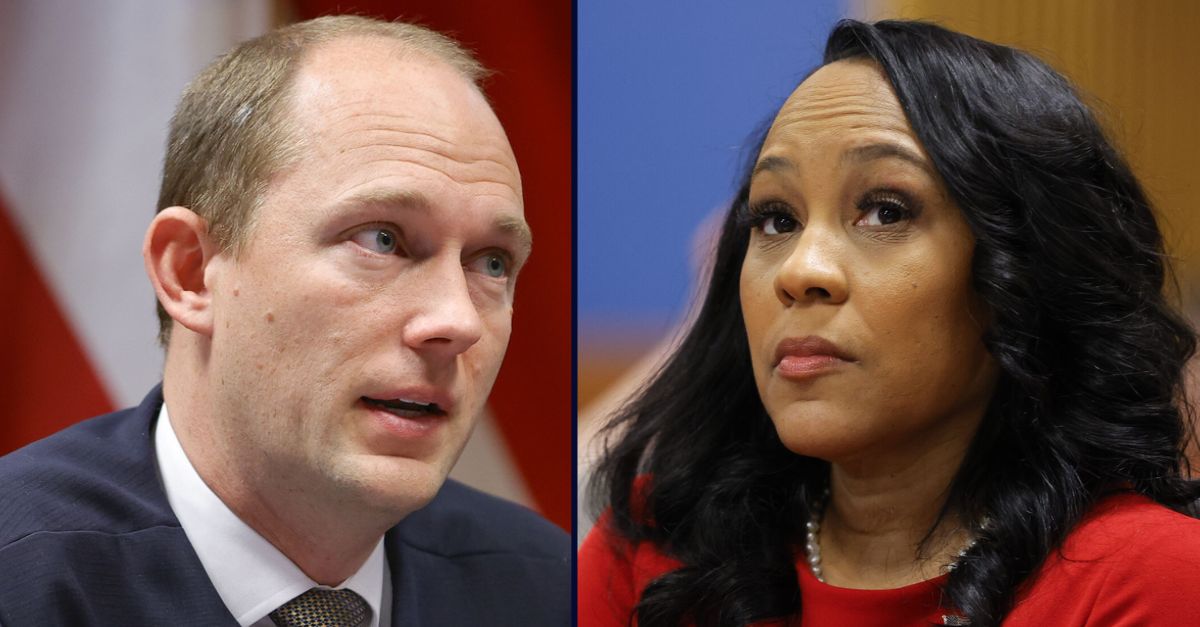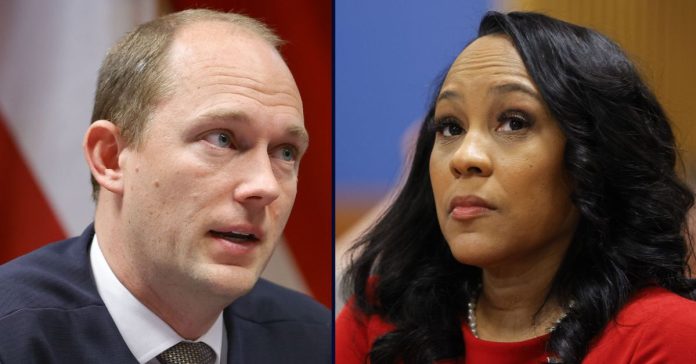
Left: Fulton County Superior Judge Scott McAfee presides over a hearing to determine whether Fulton County District Attorney Fani Willis should be removed from the case because of a relationship with Nathan Wade, Friday, March, 1, 2024, in Atlanta (AP Photo/Alex Slitz, Pool, File). Right: Fulton County District Attorney Fani Willis arrives during a hearing on the Georgia election interference case, Friday, March, 1, 2024, in Atlanta (AP Photo/Alex Slitz, Pool).
It”s strife in Fulton County, Georgia, as a well-known judge questioned the judgment of Fulton County District Attorney Fani Willis over the contours of a plea deal for a repeat offender this week.
In the underlying criminal case, Robbie Lewis was ultimately sentenced to spend the next 10 years behind bars – and then will spend the next 10 years outside of prison on probation.
The defendant, who has a long and varied rap sheet, was initially facing 13 charges – including two counts of aggravated assault; one count each of aggravated assault not resulting in serious bodily injury, aggravated battery, false imprisonment, kidnapping, armed robbery, and robbery by intimidation; as well as five firearm-related offenses.
On Tuesday, Fulton County Superior Court Judge Scott McAfee begrudgingly signed off on the accord between the state and the defense – after the victim of the crime outright rejected it.
“They robbed me, they beat me up, they hit me with the gun, they stole my money, they took all the keys to my cars…and I’m suffering from that. I’m not accepting it, your honor,” Shahram Moshiri-Zavieh said during the sentencing hearing, according to courtroom report by Atlanta-based ABC affiliate WSB.
The court acknowledged the victim’s feelings – and then some.
McAfee took the opportunity to note that Willis’ office was responsible for coming up with the plea arrangement – not him.
“We’ll note that if the district attorney is concerned the bench here in Fulton County is soft on crime,” the judge said, “this offer did not come from the bench.”
McAfee even took the opportunity to run through some of the evidence law enforcement marshaled against the defendant – seemingly highlighting his hesitation with accepting the arrangement: “We’ve got DNA, cell phone records, and video footage.”
As the hearing dragged on, the court’s consternation took the form of probing questions for the prosecution.
“If the state could just walk me through the basis for their reduction?” McAfee asked. “I’m familiar with the facts of this case. And I’m familiar with Mr. Lewis’ history. I think this is the most serious case I’ve seen Trial Division have – maybe in the past year.”
Had the state not held to its end of the bargain, Lewis faced life in prison due to his lengthy criminal history.
A man named “Robbie Lee Lewis” has over three dozen charges dating back to 2006, according to Fulton County court records. The latest charges filed against the defendant came in August 2024.
The district attorney defended her office’s decision not to pursue Lewis as a recidivist – which can be a formal designation that comes with sentencing enhancements – in an email to the TV station.
“In this case, the Defendant was sentenced to 25 years to do 10 years,” Willis said. “He will serve every day of 10 years in a Georgia penal facility because he plead guilty to kidnapping.”
After the askance question-asking, the court did accede to the deal exactly as proposed, the district attorney pointedly noted.
“A judge is ultimately ALWAYS responsible for sentencing,” the Willis email continues. “Clearly Judge Scott McAfee thought the sentence was appropriate because he accepted the sentence and made no amendments as he has the legal authority to do.”
Consternation between Willis and McAfee, of course, is nothing new. In fact, in Fulton County, it’s a long and winding narrative.
McAfee famously oversaw the unsuccessful attempt to prosecute President Donald Trump for racketeering (RICO) and election interference crimes. While the district attorney’s case saw some guilty pleas at the outset, the case went off the rails early last year.
Readers will recall that, by late January 2024, nine codefendants joined together in a seesawing effort to have Willis disqualified due to her romantic relationship with then-special prosecutor Nathan Wade.
McAfee found the allegations credible enough to hold a series of highly damaging hearings during the spring of 2024.
And, while declining to take Willis off the case himself, McAfee harshly upbraided the district attorney for “a significant appearance of impropriety.” In the end, the judge gave Willis and Wade the opportunity to choose who would stay and who would go – and then he gave the Trump defendants permission to immediately appeal and press their disqualification effort further up the judicial ladder.
That effort to disqualify Willis quickly picked up steam. The dismissal case then went before the state’s court of appeals. In late November 2024, after Trump was elected to become the nation’s 47th president, the appellate court paused further proceedings “until further notice.”
The disqualification victory for the Trump-aligned defendants came by way of the Georgia Court of Appeals in December 2024.

